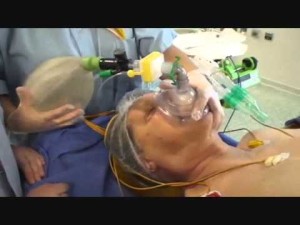
Around the year 2008 an agency nurse intubated a patient that was obtunded, had decreased respirations, and decreased oxygen saturation and was ultimately barred from the hospital….What If…that nurse had not performed the intubation and the patient had coded and died.
The setting is a level one teaching hospital ICU that has a residency/fellowship program. At night, in the ICU, there is a physician present in the hospital; and often in the unit. One night a patient that had been awake and alert, became obtunded with decreased respirations and DECREASED oxygen saturation. Increasing the oxygen administration via a face mask did not alleviate the patients’ respiratory issues. The resident was paged and refused to come to the unit. Eventually (this was not a spur of the moment, quick decision), after paging the resident a second time and bagging the patient with a mask in the interim, an agency nurse that also had their paramedic training and functioned as a paramedic at times, intubated the patient. When the resident did eventually come to the unit and found the patient intubated he was very angry. The patient had been over-sedated, received reversal medication, and was extubated within the next couple of hours.
The agency nurse had not been the patient’s assigned nurse; that nurse had floated to this ICU from another ICU. Repercussions from this event included the agency nurse being barred from working at that facility in the future; the nurse that had been assigned that patient was suspended for a months (I am not sure of the exact amount of time); and the charge nurse that night for the unit was disciplined.
Questions and thoughts to ponder:
- The nurse cannot prescribe medication and therefore could not give a reversal agent without an order.
- One could also say that there is a hospital policy against nursing intubating patients and thus could not perform this action.
- What if the patient had not been intubated and had coded? Who would have been responsible for this situation?
- What else could the nurses have done, in lieu of intubating the patient?
- Mask/bag the patient and notify the nursing supervisor of the situation; thus assuming that they would come up with a physician to attend to the patient in the unit.
- Mask/bag the patient until someone eventually came (if they could maintain adequate oxygenation with this action).
Having the ability to perform an act, such as intubation, does not necessarily mean that one should go through with that action. But one does have to take all issues related to the patient’s care into account when making this decision (if they have certification to perform the act). Could the patient’s safety/health been effectively dealt with if the nurse did not intubate the patient? Since hemodynamically that patient had been stable would maintaining the patient with bag/mask ventilation for a significant period of time have been prudent? Here one has to take into consideration, in an obtunded patient, that aspiration is a significant risk. If the answer to these questions was no, then should one go against hospital policy and perform the act to in their mind “save: the patient?
Helen StraskoRN, CLNC, CCRN-R, and CPC
Fortunately w/ACLS protocol now a days, a L.M.A. or Laryngeal mask airway is allowed to be placed & is considered as an advanced airway until either R.T. or Anesthesia comes to the bedside for a possible E.T.T. placement.
This situation has occurred in other facilities & the Nurse who acted to “save” the pt. was legally prosecuted. In many Critical Care Units, situations such as this have covered themselves with “standing orders” that provide Dr.’s orders in many emergency areas/situations. It’s tragic that a Professional was disciplined in this manner. What happened to the resident who refused to come to the emergency, or “Failure to treat the pt.?? Where was the Nursing Supervisor in this situation? They have the authority to call the Resident’s attending to ntfy the attending of his/her refusal to respond to an emergency.
Very tragic situation in many ways.